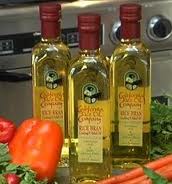 When comparing the health, cooking, and nutritional properties of rice bran oil versus olive oil, you’ll find more similarities than you will differences. Because both are natural vegetable oils, they have many things in common, but with some subtle differences.
When comparing the health, cooking, and nutritional properties of rice bran oil versus olive oil, you’ll find more similarities than you will differences. Because both are natural vegetable oils, they have many things in common, but with some subtle differences.
In the Western world, extra virgin olive oil is renowned for its healthful properties. But in much of the Far East, rice bran oil takes its place near the pinnacle of healthiest oils, due mainly to rices ubiquity in that part of the world.
I live in Thailand, and in Thai language the word for “eat” literally means “eat rice”. That is how ingrained into the culture rice is in this part of the world. So here, rice bran oil is king, and many Thai people have never even tasted olive oil.
Which is healthier?
The research on olive oil is quite conclusive that it is very healthy when consumed in moderation and used to replace more harmful saturated fats in the diet. The research is not as conclusive, however, with rice bran oil and you will find people on both sides of the argument, and with quite strong opinions about the subject.
The key comes down to the manufacturing process in both types of oils. The healthiest oils are cold pressed without the use of chemicals in the extraction process. This is what the term “extra virgin” refers to for olive oil, meaning it has simply been cold pressed without the use of mechanical means. The minimal processing ensures that the healthy enzymes and nutrients in the oil are not degraded during the manufacturing process.
The healthiest rice bran oil is processed in a similar manner. Look for bottles that are processed in a similar manner, which should be stated directly on the label. Also, high-quality rice bran oil will be sold in opaque bottles, which prevent sunlight from degrading the product.
The healthy nutrients in all vegetable oils break down quickly when exposed to sunlight. Never choose oil that is packaged in a plastic bottle, because harmful chemicals from the plastic can be leached into the oil.
Nutritional comparisons
Both oils are composed of 100% fat, but olive oil contains more monounsaturated fat which has been linked to increased “good cholesterol” in the blood, whereas rice bran oil contains more polyunsaturated fat and has a significantly higher content of vitamin E. Both oils are a great source of naturally occurring antioxidants, which help to prevent cancer and DNA mutation within our cells.
Which is better for cooking?
This is one area where rice bran oil is significantly better because it’s smoke point, or the temperature at which it burns, is 490° whereas the smoke point for olive oil is only 350°.
Olive oil is best use as a spread or dip on salads and bread, and not for cooking for this reason. Rice bran oil can be used for cooking or frying, but make sure that its smoke point is never reached, because harmful carcinogens are created when it is burned.
Conclusion
Both types of oils are much healthier than saturated fats, and it comes down to a matter of personal taste, and possibly geography, as to which one you prefer. The key for health is choosing a high-quality brand of oil that was processed minimally, and packaged and stored in a way that preserves its nutrients best.
Olive Oil Favorites
 |  |  |
| Extra Virgin Olive Oil | Extra Virgin Avocado Oil | Olive Oil Sprayer |


Leave a Reply